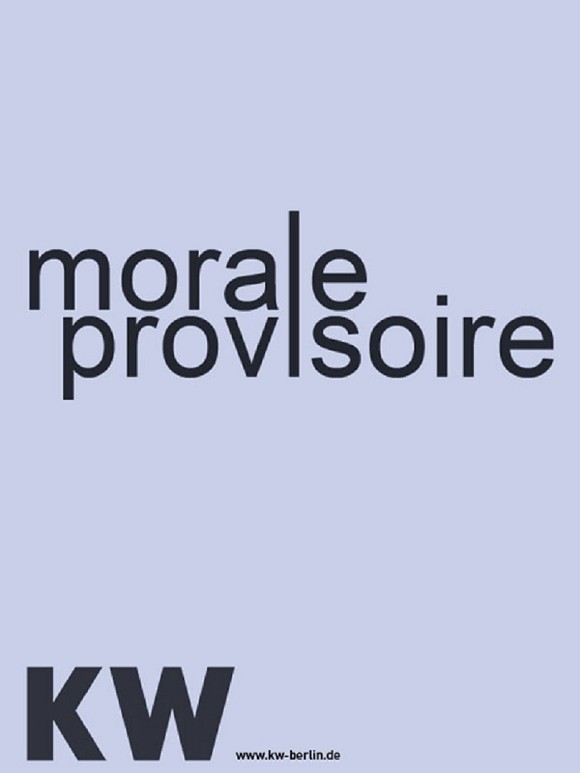morale provisoire discussion #3: Alberto Toscano. A Scalpel and a Compass: Morale Provisoire and Cognitive Mapping
morale provisoire discussion #3
Alberto Toscano. A Scalpel and a Compass: Morale Provisoire and Cognitive Mapping
21.09.2010, 7 pm
In the 1980s and 1990s, Fredric Jameson identified one of the symptoms of the postmodern condition in the inability to produce effective situational representations capable of locating and orientating action within a social totality. He also gestured towards a yet-inexistent ‘aesthetic of cognitive mapping’ (a term he then revealed to be synonymous with class consciousness), that would take this work of totalising and strategic representation or figuration upon itself. Is an aesthetic of the totality (and of the economy, perhaps more than of politics) a sine qua non for meaningful political action? To what extent is the resurgence of models of politics founded on the axiomatic, the decision, principle or partisanship a symptom of the failures of cognitive mapping or a possible way of rethinking the relation between tactics, ethics and totality? Can we escape ethical dualism or political fatalism as the twin reactions to the failure of cognitive mapping? This talk will explore these questions, and the aesthetic or representational facets of morale provisoire, by filtering them through recent representations of capitalism as totality and by revisiting the dialectics of (ethical) decision and (economic) system in the writings of the young Lukács, the plays of Sartre and Badiou’s recent reflections on the idea of communism.
Alberto Toscano is Senior Lecturer in Sociology at Goldsmiths, University of London. He is the author of Fanaticism: On the Uses of an Idea (Verso, 2010) and The Theatre of Production: Philosophy and Individuation Between Kant and Deleuze (Palgrave, 2006). He sits on the editorial board of the journal Historical Materialism.
Following the lecture, there will be a talk with Alberto Toscano, Frank Ruda and Jan Völker.
The event will be held in English language. Admission is free.
morale provisoire discussion series
Descartes gives the example of the travellers who got lost in the woods. In order not to remain in the same spot or lose their bearings they need a "morale par provision" to guide their steps. A "morale provisoire" is a determined attempt to follow a direction, it approaches thinking in terms of guiding principles for the practice. In a Kantian sense, to orientate oneself in thinking means to follow the subjective principle of reason; and thus, like Rousseau, to first of all let go of what is regarded as facts: everything that is there, be this bodies or languages, individuals or communities praised by the maxims of today's time. Badiou counters these through his idea of a subjective orientation in which the subject departs from an impossible starting point. The series morale provisoire is set against the libertarians, liberals, sophists and social chauvinists of our times and intends to bring together guiding interventions for theory and practice. The series aims at a new courage of thinking which approves of the impossible, the infinite, the same and the illegitimate. Morale provisoire pursues a Jacobinism of thinking which, on its path out of disorientation, continually redefines its enemies.
On an irregular basis, the morale provisoire discussion series will present militant thinkers whose works can be read in relation to the questions a morale provisoire poses. Together with the speakers the series looks at whether today there is a demand for a "morale provisoire" as a concept both for thinking as well as for everyday actions – and if so how it would be possible. To what extent are subjective orientations at all possible in a time which can be understood as generally disoriented? In which way can this be understood as a time of disorientation? Which are the means of analysis? To what extent do subjective orientations have to depart from impossible situations? How can such points be described; what determines and preconditions them? What could be considered as figures, points, means and methods of such a morale provisoire and how and where do we recognize its enemies? How to give less weight to descriptions of disorientation and more to the analyses of impossible departure points of new trajectories and forms? The invited guests are not only philosophers but moreover friends whose works circulate around one or several conditions of philosophy – art, love, politics, science.
The discussion series morale provisoire at KW Institute for Contemporary Art in Berlin augments a book series of the same title published by Merve Verlag and edited by Frank Ruda and Jan Völker. In conjunction with the publishing house and the editors the discussion series dedicates itself to regularly bringing together orientations in terms of science, politics, art and love in order to assess how these are committed to the field of philosophy.
Project management KW Institute for Contemporary Art: Anke Schleper


